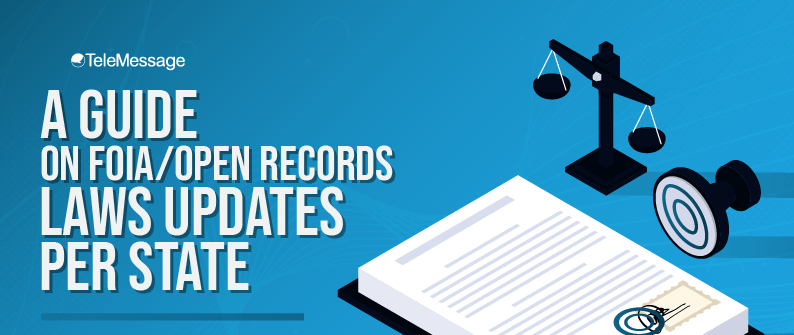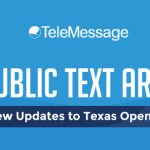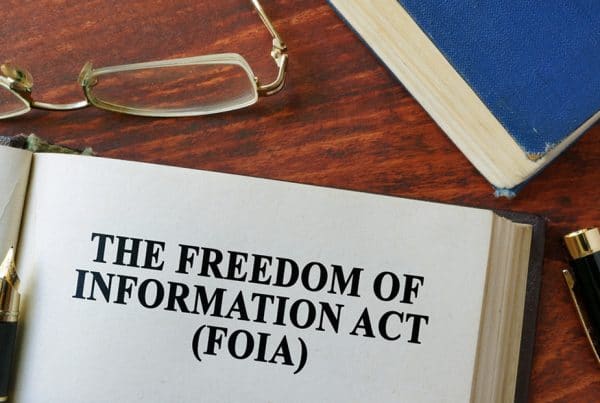In May 2019, the Texas Government passed updates to Texas Open Records Laws, and now requires any public officials who texts about public business to capture and record SMS for at least two years. The passing of those legislations has made Texas the latest state to update its open records laws in an effort to enhance government transparency and cope with the changing technological landscape in the public sector.
The current wave of new open records laws, also known as state sunshine laws, public records laws, and are also collectively referred to as FOIA laws, has caused ruckus among open government advocates and public officials across the country, reviving the debate of whether the latter are responsible for making their text messages, voice calls, and other mobile communications open for public access and scrutiny.
Here’s a state-by-state look at the latest changes on FOIA/Open Records laws.

- Arkansas
The 2019 changes in Arkansas Freedom of Information Act now states that public meetings must be recorded “in a manner that allows for the capture of sound,” and those recordings must be maintained for one year. This new requirement is applicable to all public meetings, which covers “all meetings, formal or informal, special or regular, of the governing bodies of all municipalities, counties, townships, and school districts and all boards, bureaus, commissions, or organizations of the State of Arkansas, except grand juries, supported wholly or in part by public funds or expending public funds.
- California
In 2018, the California Legislature passed SB1421 (Right to Know Act) which gives the public the right to access to records related discipline of peace officers conducting investigation job-related dishonesty, sexual assault against a member of the public and specified use-of-force incidents.
- Colorado
In 2017, Gov. John Hickenlooper signed Senate Bill 17-040 which ratified a long-overdue update to the Colorado Open Records Act. The new provision clarifies the public’s right to obtain digital public records in useful file formats that allow for searching or sorting.
- Connecticut
In October 2018, the General Assembly added two new Freedom of Information Laws. The first added to General Statute § 1-206, making it easier to get relief from a vexatious requester. The second addition was in General Statute § 1-214, which prescribes that if the public agency does not reasonably believe that the disclosure would constitute an invasion of privacy, the agency shall first disclose the documents, and after that notify the employee that it happened.
- Florida
In 2017, Governor Rick Scott signed new bills that amended Chapter 119.12 of Florida Public Records Act. The amendment makes it clear that the five-day notice requirement only applies if the agency prominently posts its records custodian’s contact information in the agency’s primary administrative building in which public records are routinely—created, sent, received, maintained and requested and on the agency’s website.
- Kansas
In 2016, the Kansas Legislature amended the Kansas Open Records Act (KORA). According to the new rule, “public records” now also includes text messages on the phone and emails in private account as long as they are related to the “functions, activities, programs or operations of any public agency.”
- Massachusetts
In June 2016, Governor Charlie Baker signed into law HB 4333 which provided significant improvement to the state’s Public Records Law. One of the changes under the new law is that documents “shall” be made available in electronic format unless the record is not available in electronic format or the requester does not have the ability to access responsive documents electronically. Furthermore, electronic documents “shall” be made available in the preferred format of the requester when feasible.
- Nevada
In June 2019, Gov. Steve Sisolak signed the SB 287, which makes it easier, faster, and cheaper for the public to get records from Nevada governments. The law states that public records should be provided promptly and without the addition of unreasonable and excessive fees. It also penalizes state and local governments with fines of up to $10,000 if they improperly delay or deny records request.
- Tennessee
The Tennessee Public Records Act has undergone several updates in recent years. In 2017, 14 related pieces of legislations were passed, including a law that allows members of emergency communications boards to participate in meetings electronically as long as they comply with the requirements for public accountability. In May 2019, a new section was added to allow additional scrutiny to proposed exemptions going forward and assure that exceptions that might be part of a larger piece of legislation on a different topic do not go unnoticed by the public.
- Texas
In 2019, the Texas Legislature passed three major bills SB 943, SB 944, and SB 1640 that significantly updated the state’s Open Records Act. SB 943 classified public-private contracting details as public records, SB 944 clarified that public employees don’t have privacy rights over public information created or received on personal device or account, and SB 1640 made discussions of public business in private, such as a walking quorum, a crime.
- Virginia
In 2019, the General Assembly passed a total of 19 bills amending the Virginia Freedom of Information Act, six of which were recommended by the FOIA council. SB 1182, is a new law which clarifies that certain requirements of current law regarding participation in public meetings through electronic communication means do not apply to meetings held to address a state of emergency declared by the Governor.
- Washington
In 2017, the Washington Legislature passed HB 1594 and HB 1595, which made a number of changes to the Washington Public Records Act. The new laws now allow agencies to charge for cost of producing electronic records, including the cost of delivery, the physical media provided to the requester, and the costs of electronic file transfer or cloud-based data storage.
Public record logs are now also required, which should include, at minimum, the identity of the requester, the date of the request, the text of the request, a description of the records produced, a description of any redacted or withheld records, the reason for red actions, and the date of the final disposition.
- Wisconsin
In 2016, Wisconsin’s Public Records Board reversed a decision it made in the previous year to change the state definition of “transitory records”, reverting back to its 2010 definition.Currently, transitory records are defined as “records of temporary usefulness that have no ongoing value beyond an immediate and minor transaction or the preparation of a subsequent (final) record” and are “of such short-term value that they are not required to meet legal or fiscal obligations, initiate, sustain, evaluate or provide evidence of decision-making, administrative or operational activities.”
- Wyoming
In 2019, the Wyoming Legislature passed a new public records law (Senate Bill 57) that gives agencies 30 days to produce records unless good cause exists for withholding them.
While the push for reforming open record laws at the state level is louder than ever, the following states don’t have any legislations passed for the past 5 years to update their respective Freedom of Information/Sunshine Laws:
| Alabama | Maine | North Carolina |
| Alaska | Maryland | North Dakota |
| Arizona | Michigan | Ohio |
| Delaware | Minnesota | Oklahoma |
| Georgia | Mississippi | Oregon |
| Hawaii | Missouri | Pennsylvania |
| Idaho | Montana | Rhode Island |
| Illinois | Nebraska | South Carolina |
| Indiana | New Hampshire | South Dakota |
| Iowa | New Jersey | Utah |
| Kentucky | New Mexico | Vermont |
| Louisiana | New York | West Virginia |
That doesn’t mean, though that all these states don’t have any plans for making access to public records easier. The lawmakers in New Jersey, for instance, are planning to pass a bill that would expand the laws governing access to government meetings and records, as well as the definition of public record. The proposed legislations would also prohibit members of a public body from communicating privately with each other about agenda items, including by email and instant messaging, during public meetings – except to discuss administrative issues.
With TeleMessage, public agencies and institutions in the U.S. can effectively leverage modern mobile messaging channels while staying compliant with state FOIA and Sunshine text archiving and mobile recording requirements. The TeleMessage Mobile Archiver is an enterprise messaging app that effectively addresses compliance, regulatory, eDiscovery response requirements and reduces risk across the public sector.
TeleMessage captures and records mobile content, including SMS, MMS, voice calls, and WhatsApp Chats from corporate or BYOD mobile phones. Messages are securely and reliably retained within TeleMessage servers or forwarded to an archiving data storage vendor of your choice.
Our mobile archiving products securely capture content from mobile carriers and mobile devices for a variety of ownership models (BYOD, CYOD, and employer-issued). With our multiple archiving solutions, you can always find the right tools or blend for your requirements:
TeleMessage offers cross-carrier and international mobile text & calls archiving for corporate and BYOD phones. Visit our website today to learn more about our mobile archiving products




